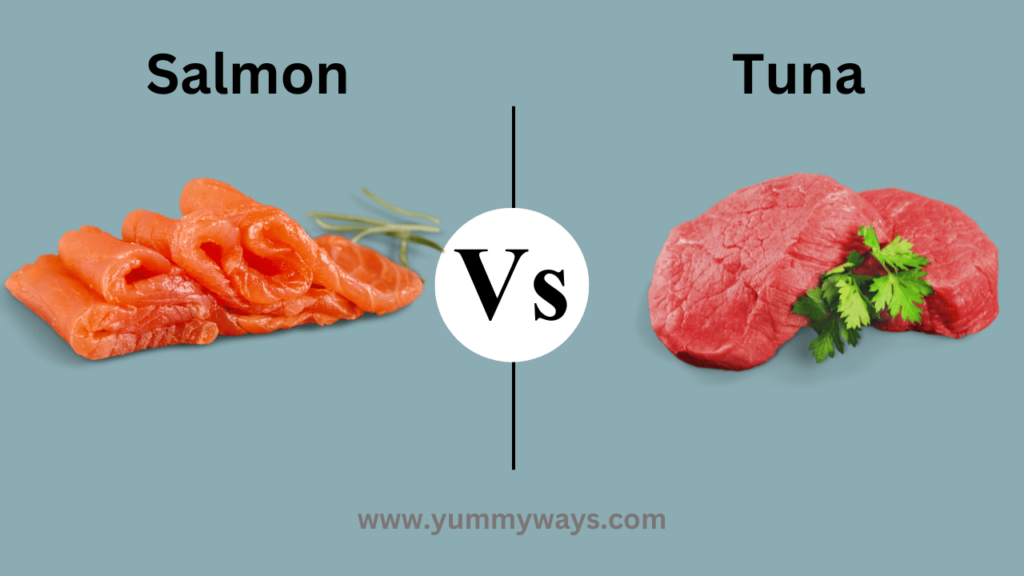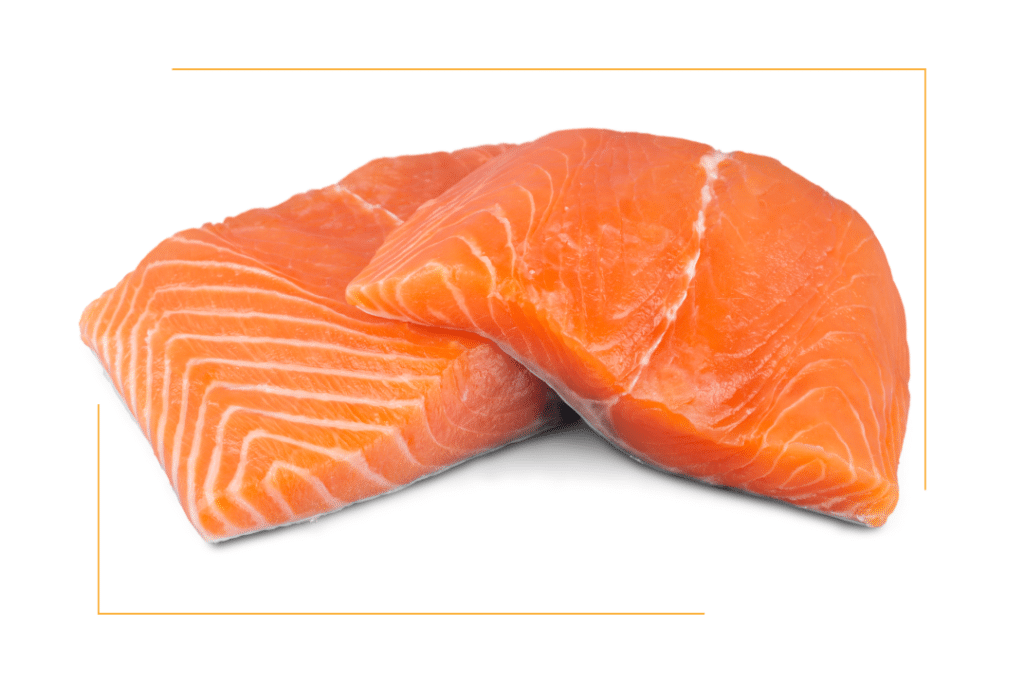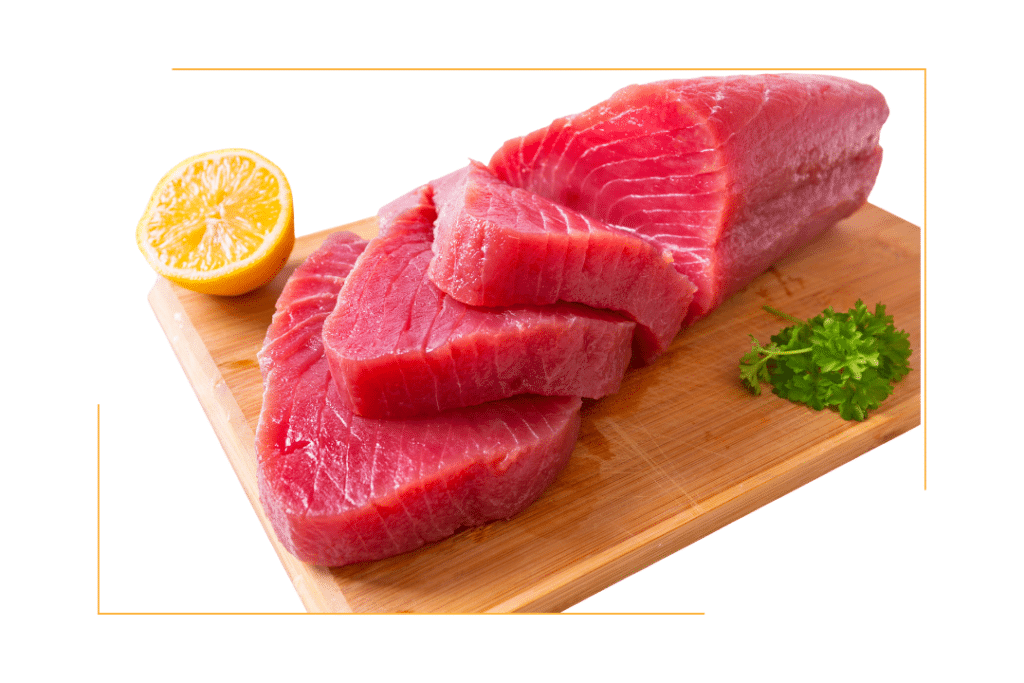Salmon and tuna have distinct nutritional profiles, differ in terms of omega-3 fatty acids and mercury content. Salmon and tuna are both popular seafood choices that offer unique nutritional benefits. While both fish are excellent sources of protein, salmon contains higher levels of omega-3 fatty acids and vitamin D compared to tuna.
Omega-3 fatty acids are known for their anti-inflammatory properties and potential heart health benefits. On the other hand, tuna is lower in calories and fat content than salmon, making it a suitable choice for those watching their waistline.
However, it’s important to note that tuna generally contains higher levels of mercury compared to salmon, so consumption should be moderated. Understanding these nutritional differences can help individuals make informed choices when it comes to incorporating these fish into their diet.

Also Read: Sockeye vs Atlantic Salmon: Which One Reigns Supreme in Taste and Flavor.
Contents
Salmon vs Tuna Nutrition
Salmon and tuna are both popular seafood choices known for their delicious taste and health benefits. The nutritional composition of these fish provides various essential nutrients that promote overall well-being. Both salmon and tuna are excellent sources of high-quality protein, which helps in muscle repair and growth.
They are also rich in omega-3 fatty acids, such as eicosapentaenoic acid (EPA) and docosahexaenoic acid (DHA), which have been linked to numerous health benefits, including reducing inflammation and improving heart health. Salmon tends to have a higher omega-3 fatty acid content compared to tuna. On the other hand, tuna is typically lower in calories and fat compared to salmon.
It is also a good source of vitamin D and provides essential minerals like iron and potassium. When it comes to making a choice between salmon and tuna, it ultimately depends on personal preference and dietary goals. Including both fish in your diet can provide a diverse range of essential nutrients that can contribute to a healthy lifestyle.
Health Benefits Of Salmon
Salmon is incredibly nutritious and packed with essential vitamins, minerals, and omega-3 fatty acids, making it a healthy choice for overall well-being. It is a great source of high-quality protein, which is vital for tissue repair and muscle growth. The omega-3 fatty acids found in salmon are essential for brain health, heart health, and reducing inflammation in the body.
These fatty acids have also been linked to improved cognitive function and reduced risk of age-related macular degeneration. Additionally, salmon is an excellent source of vitamin D, a nutrient that many people are deficient in, and it is also rich in B vitamins, which are important for energy production and brain function.

Health Benefits Of Tuna
Tuna is a rich source of lean protein, making it an excellent choice for those looking to build and repair muscles. It is also packed with essential nutrients such as omega-3 fatty acids, which have been shown to reduce the risk of heart disease, lower blood pressure, and improve overall cardiovascular health. Additionally, these fatty acids can help reduce inflammation in the body.
Tuna is a good source of vitamins and minerals like vitamin D, B vitamins, selenium, and potassium. These nutrients are vital in various bodily functions, including bone health, immune system support, and nerve function. The fish is low in saturated fat and calories, making it a suitable option for weight management.
However, it’s important to note that while tuna offers numerous health benefits, it should be consumed in moderation due to concerns about mercury contamination, particularly in larger species like albacore tuna.

Nutritional Value Of Tuna & Salmon
Tuna is an excellent source of omega-3 fatty acids, which are essential for maintaining a healthy heart and brain function. These fatty acids are known to reduce inflammation in the body and lower the risk of chronic diseases. Tuna also contains a high amount of protein, making it a great choice for individuals looking to increase their protein intake.
In fact, tuna has a slightly higher protein content than salmon. Apart from protein and omega-3 fatty acids, tuna is rich in other important nutrients as well, including vitamins such as B vitamins, selenium, and potassium. These nutrients play a crucial role in maintaining overall health and wellness.
Also Read: Fish vs Shark: Know The Differences
Omega-3 Fatty Acids: Salmon Vs Tuna
Omega-3 fatty acids play a crucial role in maintaining good health and are known for their numerous benefits. Both salmon and tuna are excellent sources of omega-3 fatty acids.
When it comes to omega-3 fatty acids, salmon is particularly rich in EPA (eicosapentaenoic acid) and DHA (docosahexaenoic acid). These two types of omega-3 fatty acids are known for their anti-inflammatory properties and are essential for brain health and cardiovascular function.
On the other hand, tuna also contains a good amount of omega-3 fatty acids, mainly in the form of DHA. While it may not have as high EPA levels as salmon, tuna still provides several health benefits, including promoting heart health and reducing the risk of chronic diseases.
In conclusion, both salmon and tuna are excellent sources of omega-3 fatty acids, with salmon being particularly rich in EPA and DHA. Including these fish in your diet can help ensure you are getting adequate amounts of these essential nutrients for overall health and well-being.
Choosing The Right Fish: Health Considerations
Salmon and Tuna are both popular choices when it comes to seafood, but it’s important to consider their nutritional value and potential health risks.
Impact of Mercury and Environmental Toxins: Mercury contamination is a concern with certain fish species, including Tuna, due to industrial pollution. Pregnant women and children should limit their intake of Tuna, as high mercury levels can be harmful to fetal development and the nervous system. Salmon, however, is generally considered safe from mercury contamination.
Recommendations for Pregnant Women and Children: It is recommended for pregnant women and young children to opt for lower-mercury fish like Salmon, which provides essential omega-3 fatty acids beneficial for brain development.
Best Options for Sustainable Fishing: When choosing seafood, it’s important to consider sustainability. Look for wild-caught Salmon from sustainable fisheries, as farmed Salmon can have negative environmental impacts.
Also Read: Cuttlefish vs Octopus: Exploring the Deep Sea Showdown
Delicious Recipe Ideas
Salmon and tuna are both delicious and nutritious options to include in your meals. They are packed with protein and essential omega-3 fatty acids, which provide numerous health benefits. Here are some creative recipe ideas to incorporate salmon and tuna into your cooking:
Mouthwatering Recipes Featuring Salmon:
- Baked salmon with lemon and herb: Season salmon fillets with lemon juice, herbs, and spices, then bake until tender and flaky.
- Grilled salmon with mango salsa: Grill salmon to perfection and serve it with a refreshing mango salsa.
- Salmon burgers: Make salmon patties with breadcrumbs, onion, and spices, and grill or pan-fry them until crispy.
Creative Ways To Enjoy Tuna In Your Meals:
- Tuna salad with avocado: Mix canned tuna with mashed avocado, lemon juice, and seasonings for a creamy and nutritious salad.
- Tuna sushi rolls: Wrap cooked sushi rice and tuna in nori seaweed for a homemade sushi treat.
- Tuna pasta: Toss al dente pasta with canned tuna, cherry tomatoes, olives, and capers for a quick and satisfying meal.
Incorporating salmon and tuna into your weekly menu is a great way to enjoy their nutritional benefits while adding variety and flavor to your meals.
Conclusion
To conclude, both salmon and tuna are excellent sources of nutrition, packed with omega-3 fatty acids, protein, and essential vitamins and minerals. While salmon is higher in omega-3s, tuna offers a good alternative with slightly lower fat content.
Ultimately, the choice between these two seafood options comes down to personal preference and dietary needs. So whether you opt for the rich flavor of salmon or the versatility of tuna, incorporating either into your regular diet can provide numerous health benefits.
See more: